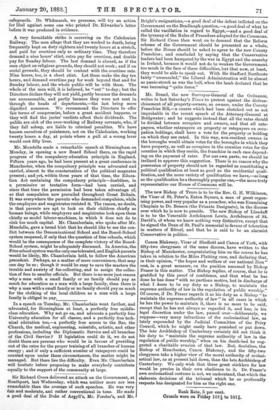Canon Blakeney, Vicar of Sheffield and Canon of York, with
fifty-two clergymen of the same diocese, have written to the Bishop of Manchester, congratulating him on the course he has 'taken in relation to the Miles Platting case, and declaring that, in their opinion, a the hopes and welfare of our national Zion" rest, in a great measure, on the position assumed by Bishop Fraser in this matter. The Bishop replies, of course, that he is gratified by this proof of confidence, and that what he has done he has done " with no partisan motive, but in discharge of what I deem to be my duty as a Bishop, to maintain the supreme authority of law in• the regulation of public worship." Of course, if Dr. Fraser regards it as his duty as a Bishop " to maintain the supreme authority of law " in all cases in which he has the power to maintain it, there is no more to be said, except that he has not always so regarded it, and has; in his legal discretion under the law, passed over—deliberately, we suppose—very many infractions of the ecclesiastical law, as lately expounded by the Judicial Committee of the Privy Council, which he might easily have punished or put down. The late Archbishop of Canterbury certainly did not think it his duty to "maintain the supreme authority of law in the regulation of public worship," when on his death-bed he sug- gested a charitable evasion of that law. But, doubtless, the Bishop of Manchester, Canon Blakeney, and the fifty-two clergymen take a higher view of the moral authority of ecclesi- astical law, as at present laid down, than the late Archbishop of Canterbury. We only wish that these great sticklers for law would be precise in their own obedience to it. Dr. Fraser's own ecclesiastical costume is not, we understand, that which the elaborate decisions of the tribunal which he so profoundly respects has designated for him as the right one.


































 Previous page
Previous page